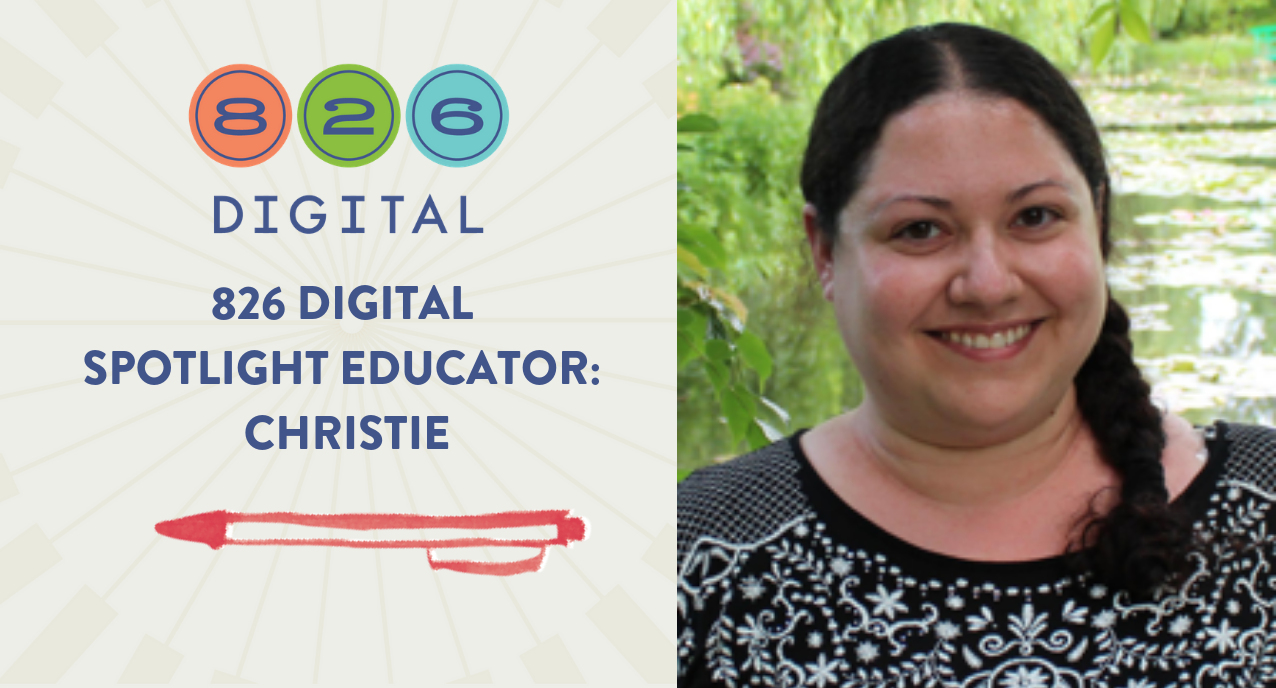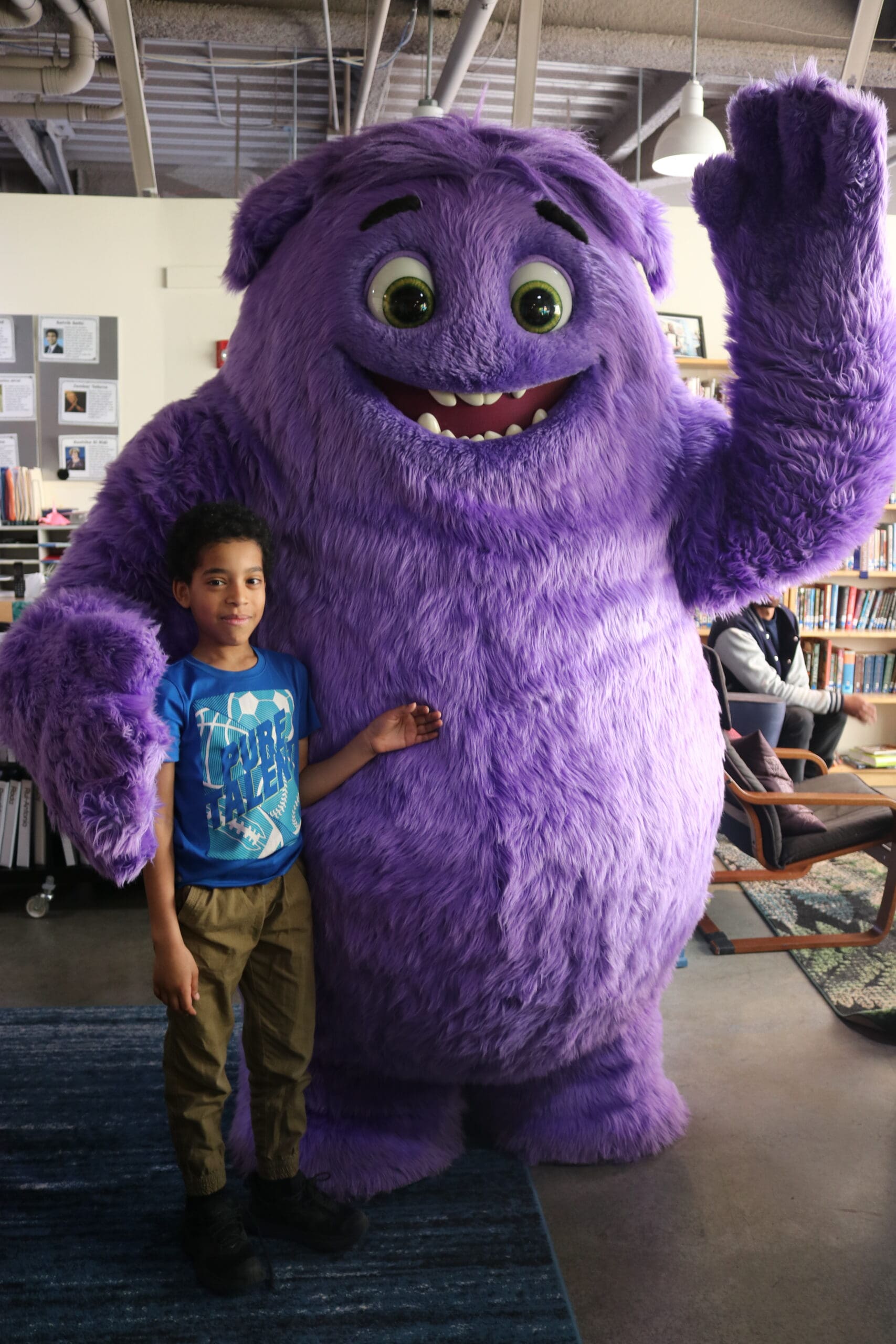
We’re honored to introduce you to our second 826 Digital Spotlight Educator, Christie Cognevich. Christie is a high school English teacher at Mount Carmel Academy in New Orleans, LA! For Christie, sometimes the abundance of creative writing resources online means it can be hard to balance the right amount of teacher-provided structure with the right amount of student freedom. The resources on 826 Digital allow Christie to create a space where students feel they have the freedom to express themselves and the freedom to fail. For Christie, this is essential for the learning that happens in her classroom.
Pssst. Do you know a teacher doing astonishing things with young writers?
Find out how to nominate them (or yourself!) to become an 826 Digital Spotlight Educator.
Why is writing important to you?
As a child born with hearing loss raised by a deaf mother, I always loved words because they are so powerful: whether spoken aloud or written, the art of communication is both difficult and beautifully mysterious. Unsurprisingly, I was a quiet kid and books were my haven for living an expansive life. I was never lonely! In some ways, there is a silence in the heart of every piece of writing that we get to fill in with our imagination—entire worlds of space for our own interpretations and mental images. Isn’t that magical? I began writing because I discovered I could build those open, inspiring worlds out of my own words and could invite people in. That was a really cool realization.
I kept writing because I really thought Highlights magazine was going to discover that I was an amazing first-grade prodigy and would print the stories I mailed in. (They did not. I think I handled it well. But I still think my story about Cottonelle the spider who wove cotton balls was lovely—they really missed out by not printing it. I still have a copy of it along with a somewhat smudged marker illustration of a purple spider if they’re interested!) And then I kept writing because after I started, I couldn’t stop. It was too much fun. I wrote my first short novel at twelve, inspired by an illustration of a harp mysteriously situated beside a river that I saw in Chris Van Allsburg’s The Mysteries of Harris Burdick. In retrospect, my tale of a magical land threatened by a wicked queen bore a distinct resemblance to the Narnia books I loved. I think C.S. Lewis’s estate would have a valid plagiarism claim against my younger self!
What’s a “highlight” moment from this year?
This year I devised a project that worked so wonderfully I still get excited thinking about it. It began because sometimes I find it difficult to balance the right amount of teacher-provided structure while still offering creative freedom—especially when I have to grade the work in some way. I fell in love with the concept of Genius Hour projects. For those who aren’t familiar, Google’s engineers are allowed 20% of their work time to focus on an autonomous pet project. Gmail was originally devised this way. In short, adapting the concept to the classroom means students can have the opportunity to create without fear of how their grades will be impacted if their vision doesn’t materialize perfectly, and the rubric will be less success-oriented and more focused on the creative process from planning to revision, as well as how they addressed setbacks.
In lieu of a final exam or final portfolio, my students pick and design an original Genius Hour project and work on it throughout the semester. The guidelines are loose:
- You will work alone on an individual project that you decide. You set the parameters and goals for what you want to do. However, the project must be related to an original, long/sustained creative writing project.
- Your personal project parameters may include relevant components of this writing project: designing the world maps to your fantasy kingdom, building an interactive webpage for your book, filming a book trailer, making a character vision board, etc. Think outside the box!
- Even if you are already working on a personal writing project, pick some new aspects of it to work on—like map design or inventing a new card game that people play in the story. Be creative!
- Again, you do not have to just write; your project components can be related to your writing.
- Your product can also wind up being unsuccessful; that has no bearing on your grade. How you deal with your success or lack of success will matter.
I set it up so that the project isn’t tied to pure word count or page length because inevitably students worry about getting writer’s block or getting bored working on one piece of writing for the whole semester. Letting them choose means giving them a lot of room to play, but I set up a lot of check-in opportunities. They begin by giving an idea pitch to the classroom and getting peer feedback, write weekly reflection discussion boards and respond to each other, turn in a regularly revised schedule/plan, and have check-in conferences with me. The best part is that failure IS an option, provided that they are transparent and demonstrate what they are doing in light of that failure.
The outcome has been spectacular. I received poetry books, memoirs, novels, and all sorts of innovative ideas in between. One student wrote an escape room story and built a website to host it so that each chapter was on its own password-protected page that could be solved from the clues in the story. Another student made a corny joke book containing her favorite jokes and silly short stories to fit them. She even handmade bookmarks printed with jokes for everyone in the class. The whole experience just has me so excited to do it again next year.
Do you have a favorite line of writing from a student work? We’d love to hear it!
I love reading my students’ writing because they constantly surprise me with their keen human insight and the thoughtful humor in their observations. One of my students wrote a delightful short story called “Syrup” about a diner waitress with big ambitions to be a journalist who had given up on her dreams—until she begins having surreal extraterrestrial experiences at the diner and quits in favor of reporting. My favorite line is a cryptic message from the waffle-loving aliens: “Humans wait for their dry hearts to be flavored/By a universe/That constantly turns their heads/Towards the syrup.” I have no idea what it means, but it’s beautiful! Like the waitress, I think we’re all looking for our syrup. I could spend the rest of my life thinking about all the fascinating, clever, funny ways in which I could interpret the aliens’ message!
I don’t know if she knows that her words are my favorite line, but I think that is part of how fun it is to be a creative writing teacher. I carry all these little stories—a piece of my students—with me in my head.
